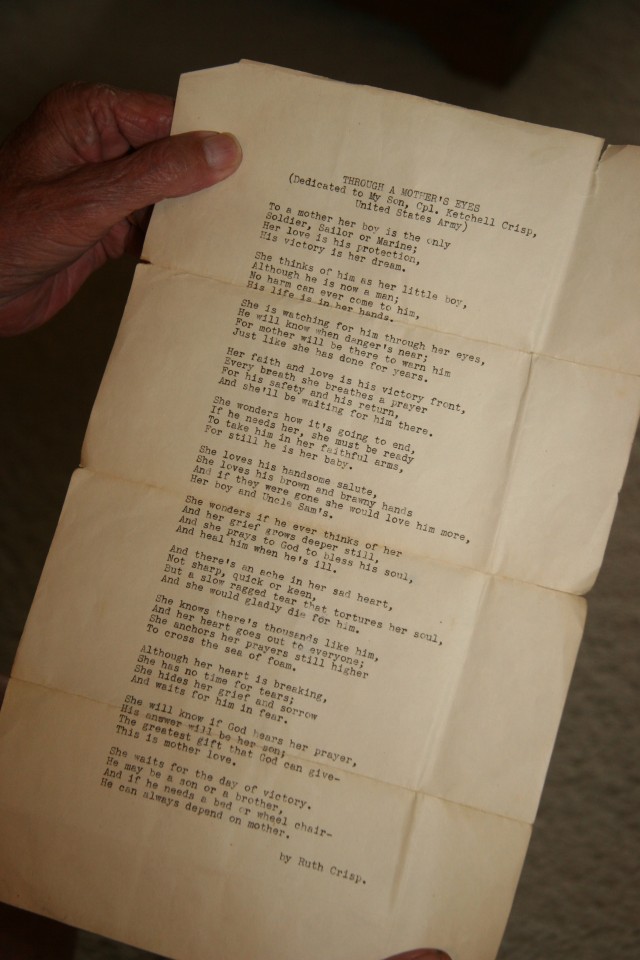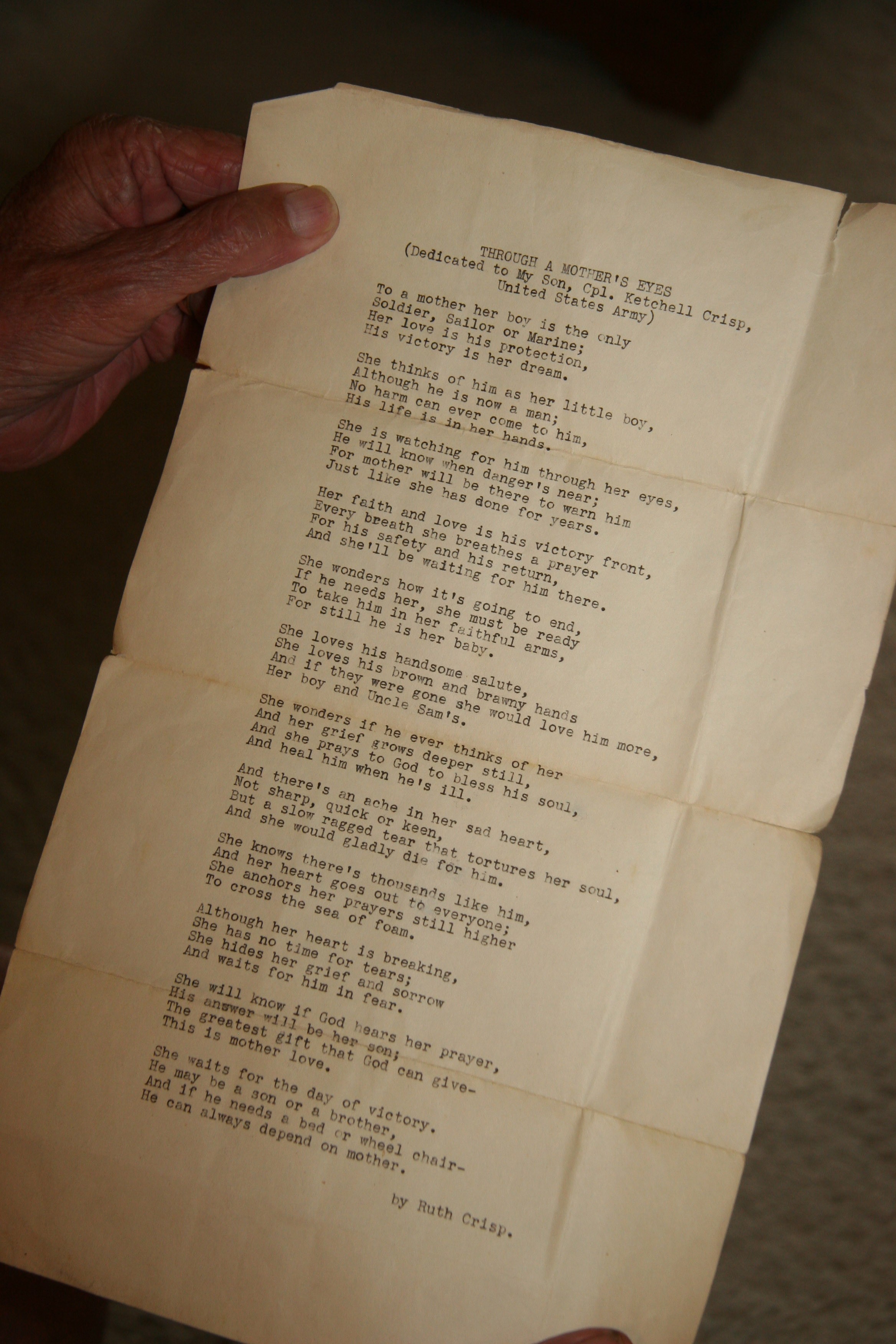COLORADO SPRINGS, Colo. - Once buried in the past, a mother's love found new life recently when a retired Fort Carson Soldier rediscovered poetry his mother wrote for his older brother, fighting with the 2nd Ranger battalion in World War II.
Herbert Crisp served in his own war, in Vietnam, but his brother, Ketchell Crisp, was the first to go following Pearl Harbor. Although not much given to outward signs of affection, the family worried about his safety.
Ruth Crisp's poem survived the decades - and remains a powerful example of a mother's love for today's Soldiers, still fighting in Afghanistan.
As one of the first elite Army Rangers, Ketchell served his country in World War II. Although 15 million people served during the war, there were only six ranger battalions, each with about 500 men.
Ketchell was one of the few Soldiers trained in cliff-scaling, invading deep into enemy territory at night and amphibious landings.
Born in Indiana in 1917, Ketchell was the second-born of 11 children. He didn't get good-night kisses or hugs. Not that his parents were cold-hearted, but they were strict, and life didn't leave them much time to play.
Years later, then, after Ketchell crossed the Atlantic Ocean to fight in the war, he was, perhaps, astonished at the intensity of his mother's love.
It's recorded for posterity in a poem she wrote in 1942.
Ruth Crisp's poem was titled, "Through a Mother's Eyes (Dedicated to my son, Cpl. Ketchell Crisp, United States Army)."
It was published in Valparaiso, Ind., that same year.
Born in Kentucky in 1896, Ruth grew up on a tobacco farm. She likely had only an eighth grade education, if that.
"How somebody with that education level could come up with that poem, I don't know," said her youngest son, Herbert.
Stationed at Fort Carson in the 1970s, Herbert is a veteran of two wars and a retired Army noncommissioned officer. In September, Herbert and his wife, Edele, went to visit his aunt and cousins in Kentucky.
As it turns out, his Aunt Virginia had kept Ruth's poem all these years.
"I tell you what - I remember it as a little boy, and suddenly there it was again after 60 years," Herbert said.
He was 5 years old when Ketchell went to war. Later, Herbert joined the Marine Corps, fighting in the Korean War, before returning to Indiana and joining the Army in 1958.
While stationed in Augsburg, Germany, he met his soon-to-be wife, Edele, drinking coffee in a cafAfA. By the time he went to the Vietnam War, the couple had four children, ages 4-9.
After being wounded twice and spending another tour of duty in Germany, he was stationed at Fort Carson in 1973 with the armored cavalry.
In 1976 he retired as a platoon sergeant, or sergeant first class.
Eighteen years younger than Ketchell, Herbert remembers his older brother returning from the war in 1946, when Herbert was 9 years old.
"He was a stern man, a no-nonsense type of person," Herbert said. "Ketchell jumped out from the kitchen and scared the holy hell out of me."
Their parents never talked about the war. The younger sibling heard about it on the radio, and "played war all the time," Herbert said. "Somebody had to be German, and somebody had to be Japanese."
Herbert recollects seeing the poem as a child; he was 7 years old when his mother wrote it. If she ever wept, Ruth didn't let her children see her. A mother's fear and love shows clearly, however, in the lines she penned.
"And there's an ache in her sad heart, not sharp, quick or keen, but a slow ragged tear that tortures her soul, and she would gladly die for him," Ruth wrote.
After the war started, two of her sons enlisted the day after Pearl Harbor. Kenny went with the Marines to the Pacific theater. Ketchell went to Europe. During the Battle of Huertgen Forest in Germany, in November and December 1944, Ketchell was wounded in the face by a ricocheting bullet, as he fought with the 2nd Ranger Battalion, attached to the 8th Infantry.
Before the war, Ketchell worked for two years in the steel mills in Indiana. Photos show that Ketchell was stocky, with broad shoulders and darkly tanned, rough skin.
"She loves his brown and brawny hands," his mother wrote.
"No longer a little boy.
"Yet her affection for him was no less real.
"If he needs her, she must be ready, to take him in her faithful arms, for still he is her boy," Ruth wrote.
After surviving shrapnel, wounds and World War II, Ketchell died in 1974 of a heart attack.
Ruth lived until age 95.
For Herbert and Edele, life in this century is much calmer than in the last one. Long-since retired from several careers, the couple lives quietly in Widefield, Colo. Tourists often find Herbert on the grounds at The Broadmoor Hotel, where he whittles and sells woodcarvings.
It's nearly a lifetime away from running across the rice paddies in 1969 in Vietnam, when "they started mortaring us" and shrapnel became embedded in Herbert's hip.
These days, Herbert prefers the slower pace of whittling, whistling a tune and rediscovering old family poetry.
Nonetheless, he still lives by the armored cavalry's old adage: "Keep your gas tank full and your eye on the skyline."


Social Sharing